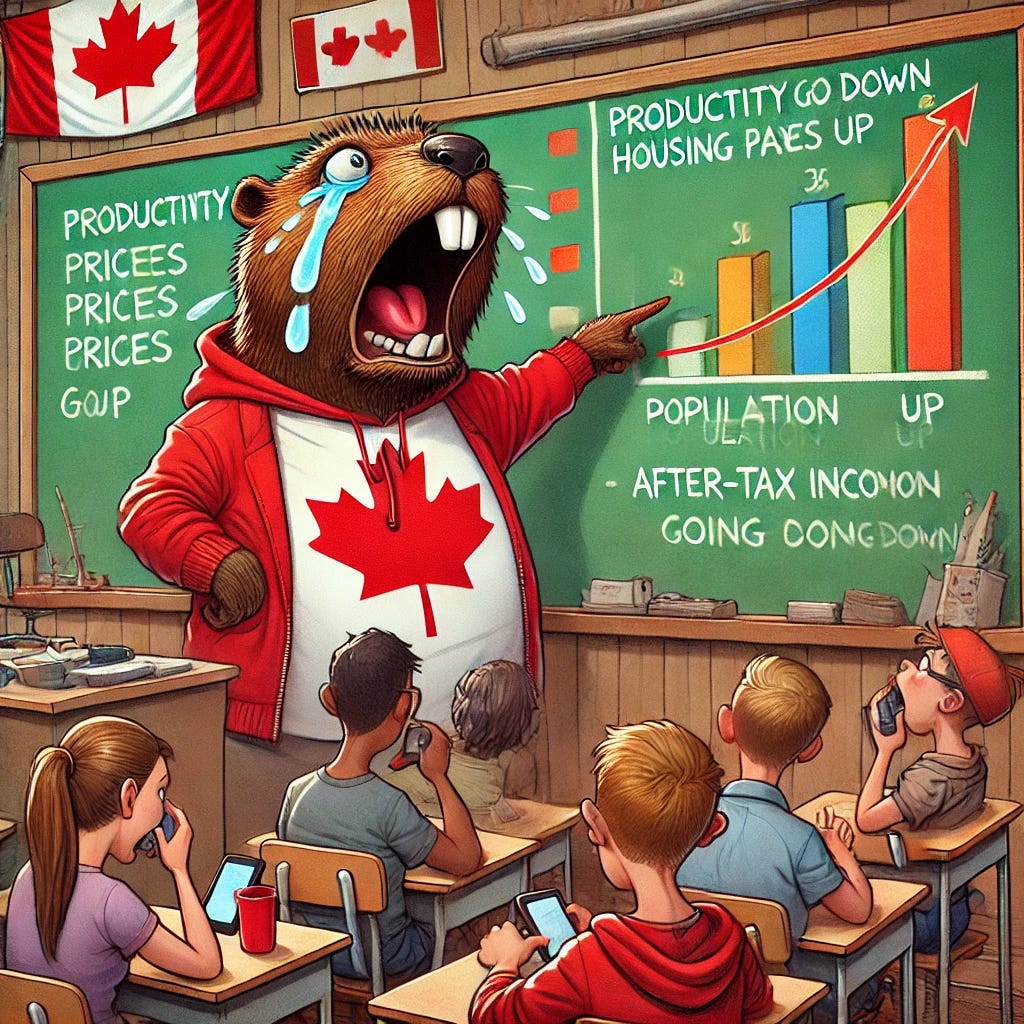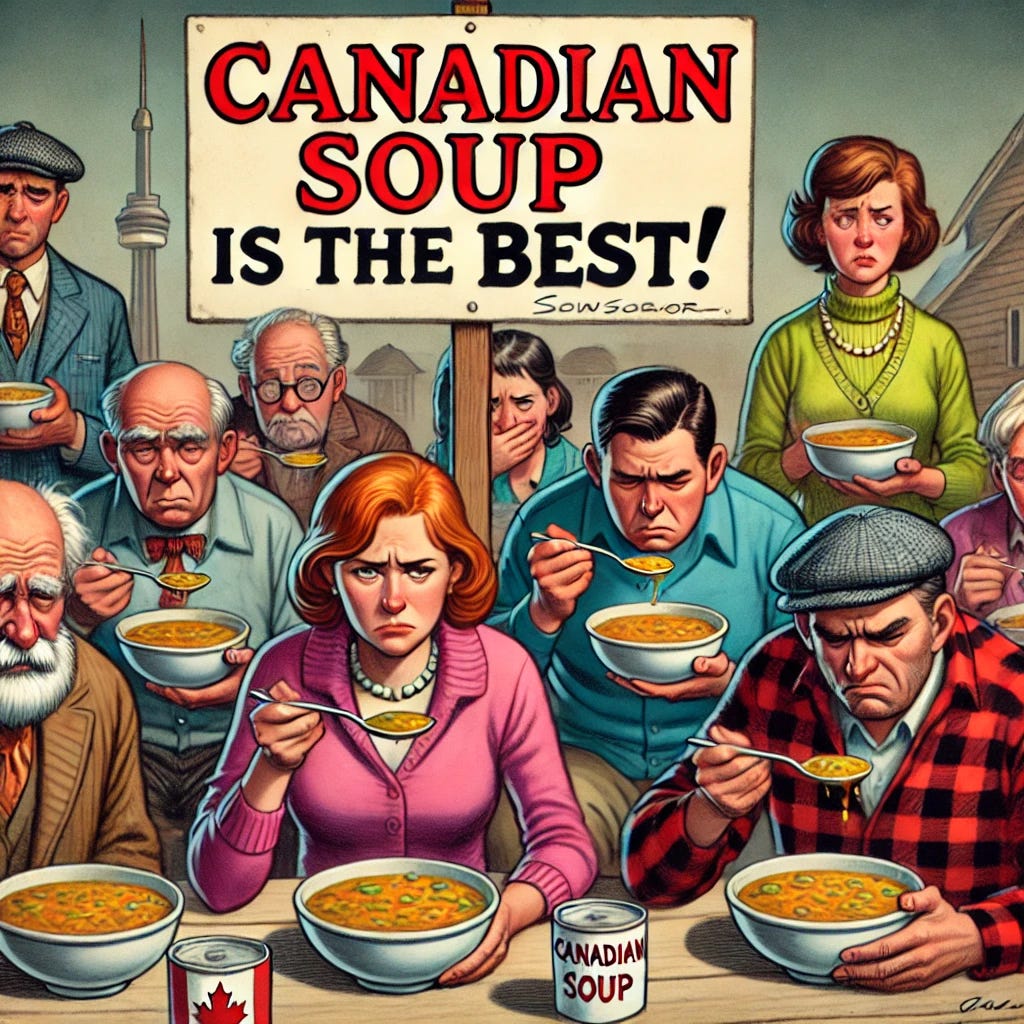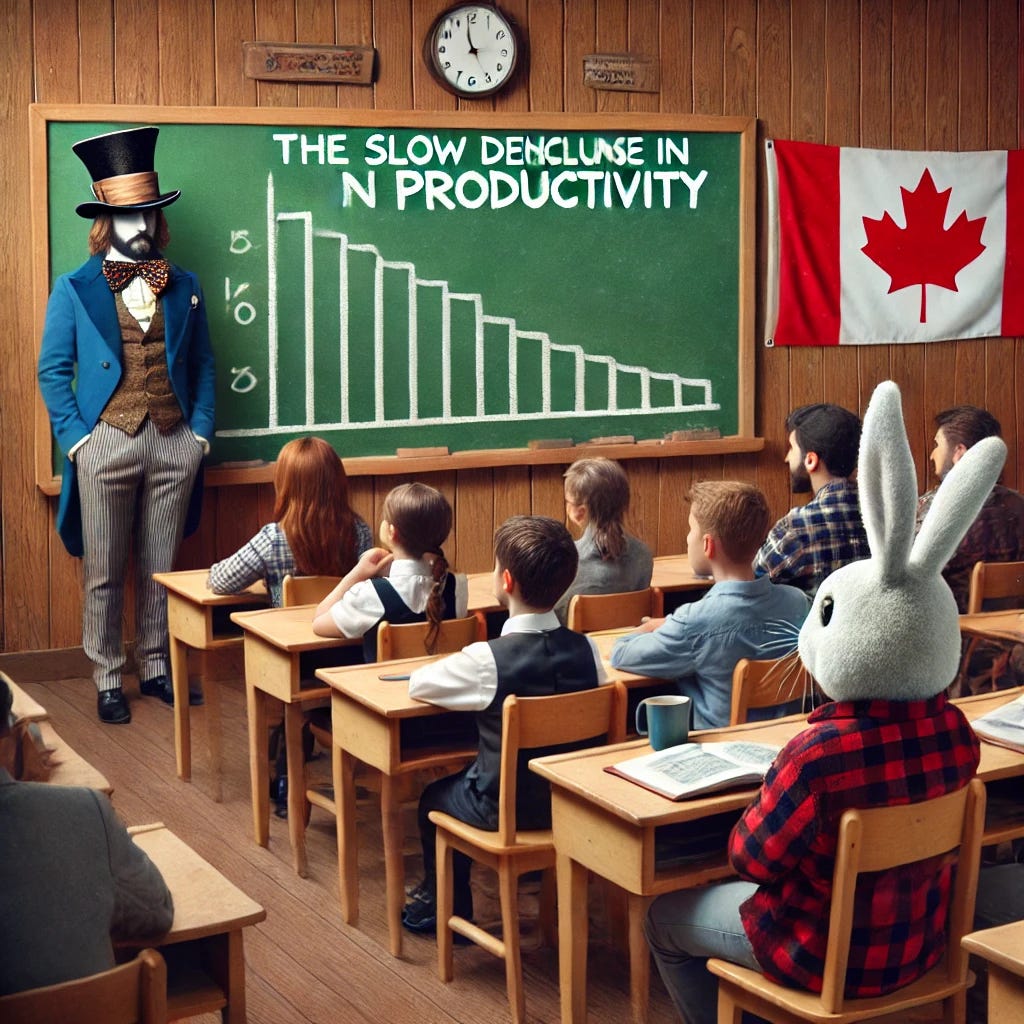If you believe in the importance of free speech, subscribe to support uncensored, fearless writing—the more people who pay, the more time I can devote to this. Free speech matters. I am a university professor suspended because of a free speech issue, so I am not speaking from the bleachers. The button below takes you to that story if you like.
Please subscribe and get at least three pieces /essays per week with open comments. It’s $5 per month and less than $USD 4. I know everyone says hey, it’s just a cup of coffee (with me, not per day but just one per month), but if you’re like me, you go, “Hey, I only want so many cups of coffee!” I get it. I don’t subscribe to many here because I can’t afford it.
But I only ask that when you choose your coffee, please choose mine. Cheers.
____________________________________________________________________
Our Canadian politeness is often not politeness but a well-packaged mix of cowardice, selfishness, and a fear of confrontation. The lack of support for a beleaguered Jewish population shows this. Why, on the street last week at the protest organized by my lovely friend Ester, was I the only non-Jew?
I was suspended, banned, and banished. Staff were allowed to defame me criminally (the big four; I assaulted a student; I was on the edge of being fired for five years and was just squeaking by; I threatened a student at home and a tolerance of an executive member that would, on the day that I was suspended without charges and a month before I received charges brag to staff that I would be terminated).
Staff tell me that they are with me, but how many of them have sent an email of support to management for me, any, no, that might hurt them, that’s too scary, and that mentality is killing our country—the old cliche about what happens if the good stays silent is true.
Is Canadian “Nice” Just Cowardice and Selfishness?
Canada has long been known for its politeness. Ask anyone worldwide to describe Canadians, and they’ll probably tell you that we’re friendly, polite, and always apologising. But this reputation, while flattering on the surface, has a darker side.
What we often think of as “politeness” is, in many cases, a mask for cowardice, selfishness, and an outright fear of confrontation.
Our society is deluding itself into thinking that being “nice” is inherently good when this fake politeness stifles open conversation, creates passive-aggressive behaviours, and hurts our culture in ways we’re only beginning to recognise.
At its core, Canadian politeness has evolved into something less about being genuinely kind and more about avoiding confrontation at all costs. We’ve come to value keeping the peace and not making waves more than we value honesty, authenticity, and standing up for what’s right. It’s as if we’ve decided it’s better to smile and nod rather than say what we mean.
Take workplace culture as an example. In many Canadian offices, employees shy away from giving direct feedback. Criticism, even when constructive, is often couched in vague, soft language to avoid hurting someone’s feelings. This may seem polite, but it’s ultimately counterproductive. When no one is willing to address issues head-on, problems fester. Projects falter, team dynamics suffer, but everyone’s too “polite” to say anything.
As Forbes notes in its article on workplace communication, constructive conflict is essential for growth, yet in Canada, we too often dodge it, pretending everything is fine when it’s not. Is it any surprise that our productivity is dipping?
Canada’s productivity per capita numbers have stagnated and even declined compared to other advanced economies. According to the OECD, Canada’s labour productivity growth has been sluggish, especially compared to countries like the United States and other G7 nations.
Between 2015 and 2022, Canada’s productivity growth averaged just 1% per year, while the U.S. managed closer to 2.3% in the same period.
This stagnation is a serious issue because productivity is directly tied to the standard of living. If workers aren’t becoming more productive, wages stagnate, and economic growth slows. A 2022 report from Statistics Canada showed that Canada’s GDP per capita fell to 19th globally, slipping from 9th place in the 1980s and 1990s.
The reasons for this decline are complex but include underinvestment in innovation, infrastructure, education, and regulatory and bureaucratic hurdles that stifle business efficiency. Without serious reform, Canada’s productivity problem could continue to drag down the country’s overall economic competitiveness and quality of life. Working from home entitlements can’t be helping.
Even worse, this fear of confrontation doesn’t eliminate conflict; it just pushes it underground. In place of open discussion, we’ve developed a culture of passive-aggressiveness, where people express their frustrations in a roundabout, often confusing way. A sarcastic comment here, a backhanded compliment there—this is how we handle our conflicts.
Consider how we often approach difficult conversations about politics or social issues. Rather than engage in a meaningful dialogue where we listen to each other’s opinions and healthily challenge ideas, Canadians tend to sweep disagreements under the rug. We’re too scared to offend or be the one who says, “Actually, I think you’re wrong.” Instead, we throw out passive-aggressive comments or complain about others behind their backs, all while keeping up a polite façade.
It’s not just unproductive—it’s toxic.
The culture of not wanting to offend is a huge part of this fake politeness. We’ve become so concerned about hurting people’s feelings that we’ve stopped engaging with tough issues altogether. This is particularly damaging when it comes to freedom of speech. Canada prides itself on being a tolerant, inclusive society, but in the name of tolerance, we often silence those with dissenting opinions, all while maintaining that “polite” exterior. I’ve run head-on into this problem over the last ten months.
Look at the current landscape of university campuses. Places that should be bastions of free thought and debate have become spaces where censorship is rampant. Professors and students alike are often afraid to speak out on controversial issues for fear of being socially ostracised or even losing their jobs.
As The Globe and Mail reported in 2021, many Canadian academics feel pressured to self-censor, knowing that any deviation from the “acceptable” narrative could result in public backlash. This isn’t politeness—it’s cowardice disguised as moral superiority.
Ironically, what we consider “politeness” is often just selfishness. By avoiding confrontation, we’re not being kind to others—we’re being kind to ourselves. It’s easier to keep the peace and stay silent than to risk an uncomfortable conversation. It’s easier not to rock the boat than to stand up for what’s right.
Consider social justice issues. Many Canadians quickly support various causes—Indigenous rights, racial justice, or LGBTQ+ equality—but how often do we go beyond lip service?
It’s polite to say you support a movement, but it’s much harder to act on it. True change requires us to step outside our comfort zones, engage in difficult conversations, and sometimes offend people with hard truths. But in a culture that prioritises politeness over all else, too many of us stay silent and let the status quo continue.
Strangely, I know that with one or two exceptions at my university, only Caribbean persons have stuck up for me. Is it something in the jerk chicken that gives them courage? Even one man who disagreed with me showed up at my house. He had balls, he listened, he was an ambulance driver who has been called the N-word, and yet he helps everyone and is a great man. And he has courage.
This is especially visible in our approach to reconciliation with Indigenous peoples. While many Canadians are aware of the historical and ongoing injustices faced by Indigenous communities, our “polite” approach often leads to performative gestures—like apologies and ceremonies—without meaningful action. Maclean pointed out in a 2020 article that Canada has become skilled at saying everything right. Still, our government and society are far less willing to engage when it comes to real policy change or redistribution of land and resources. Politeness becomes an excuse for inaction.
Canada’s obsession with politeness is also hurting our national identity. By constantly deferring to others and avoiding confrontation, we risk losing the qualities that make a nation strong—confidence, assertiveness, and a willingness to stand for something. Canada is often seen as a middle power on the global stage, content to be a peacekeeper rather than a leader. This reluctance to take bold stands is mirrored in our domestic policies, where we are often slow to act on important issues like climate change, housing affordability, and economic reform.
Meanwhile, despite all their faults, our neighbours to the south aren’t afraid to speak their minds or take bold actions. Americans have a reputation for being bold and direct, but that willingness to confront problems head-on makes them effective on the world stage. In contrast, Canada’s fear of rocking the boat leaves us reactive rather than proactive.
So, what’s the solution? How do we move away from this delusion of politeness and toward a culture that values authenticity, honesty, and courage? It starts with changing our mindset about what it means to be polite. True politeness isn’t about avoiding confrontation or tiptoeing around people’s feelings. It's about being respectful but also honest. It’s about engaging in difficult conversations without resorting to passive aggression or fear.
We need to start embracing discomfort.
Discomfort is a necessary part of growth, whether it’s in our personal lives, our workplaces, or our society as a whole. We must be willing to offend people sometimes—not intentionally, but as a byproduct of standing up for our beliefs. If we never offend anyone, we’re not pushing hard enough on the issues that matter.
In a piece for the CBC, commentator Neil Macdonald said, “Canadian politeness is more about protecting oneself than showing consideration for others.” He’s right. We need to stop confusing self-preservation with kindness and focus on what’s important: truth, authenticity, and courage. These traits build a strong culture—not fake politeness and fear of confrontation.
Canada’s reputation for being polite is no longer the harmless quirk we think it is. What once symbolised kindness and civility has become a tool for cowardice, selfishness, and passive-aggressive behaviours. By avoiding confrontation and staying “nice” at all costs, we’re allowing problems to fester, stifling free speech and weakening our national identity. To move forward, we must redefine what being polite means. It’s time to embrace honest conversations, even when they’re uncomfortable, and stop hiding behind the delusion of politeness holding us back.
If you believe in the importance of free speech, subscribe to support uncensored, fearless writing—the more people who pay, the more time I can devote to this. Free speech matters. I am a university professor suspended because of a free speech issue, so I am not speaking from the bleachers. The button below takes you to that story if you like.
Please subscribe and get at least three pieces /essays per week with open comments. It’s $5 per month and less than $USD 4. I know everyone says hey, it’s just a cup of coffee (with me, not per day but just one per month), but if you’re like me, you go, “Hey, I only want so many cups of coffee!” I get it. I don’t subscribe to many here because I can’t afford it.
But I only ask that when you choose your coffee, please choose mine. Cheers.
____________________________________________________________________
If you believe in the importance of free speech, subscribe to support uncensored, fearless writing—the more people who pay, the more time I can devote to this. Free speech matters. I am a university professor suspended because of a free speech issue, so I am not speaking from the bleachers. The button below takes you to that story if you like.
Please subscribe and get at least three pieces /essays per week with open comments. It’s $5 per month and less than $USD 4. I know everyone says hey, it’s just a cup of coffee (with me, not per day but just one per month), but if you’re like me, you go, “Hey, I only want so many cups of coffee!” I get it. I don’t subscribe to many here because I can’t afford it.
But I only ask that when you choose your coffee, please choose mine. Cheers.
____________________________________________________________________









This is my cure for brutal insommia.